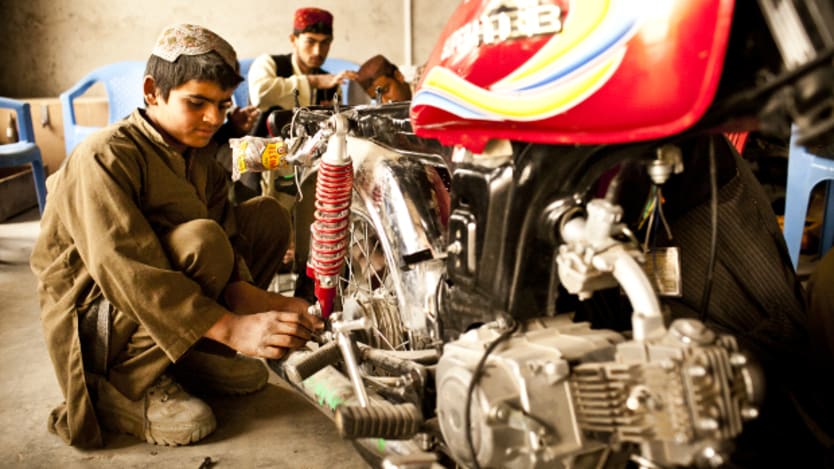
Sometimes you get asked questions that are not only difficult to answer, but that stay with you.
Two years ago, I conducted a youth employment assessment in southern Yemen. During a focus group with unemployed youth in Aden, one young woman shared her frustrations with not finding employment despite the fact that she had a lot to offer. Sarah was a university graduate with diverse language skills. She had participated in several business skills classes and career workshops. She had a polished CV and had dedicated many hours to looking for a job. Still, Sarah couldn’t even land an interview.
While she explained her situation, the other focus group participants nodded their heads in silent solidarity.
“Why will no one give us a chance?” she asked.
Sarah is not alone in her predicament. Seventy-five percent of the population in Yemen is under the age of 30, with youth unemployment rates estimated at 60 percent. Statistics across much of sub-Saharan Africa, the Middle East and Asia tell similar stories of extremely young populations and skyrocketing youth unemployment and underemployment rates.
Uganda, for example, has one of the youngest populations in the world, with youth unemployment rates surpassing 65 percent. These figures are becoming less and less startling, instead becoming a “new normal.” Globally, youth unemployment has become a significant concern for governments, young people, economists, nongovernment organizations, donors and the private sector.
The development community has responded to these challenges with vigor. Youth employment programs promoting vocational training, life skills, apprenticeships and mentoring are a part of development initiatives from Latin America to Central Asia. Furthermore, we’ve become really good at hitting common indicators such as “number of youth trained” for these types of programs.
But there’s still more to the story.
See more stories from #YouthWill Create Opportunity:
● Ways out of the global youth unemployment crisis
● Investing in youth skills is a no-brainer
● Youth economic development programs: A formula for success
● Which countries have the highest (and lowest) youth unemployment rate?
● How data could help Tanzania's young informal workers
● Rebranding agriculture as a business for youth in Africa
● In Maldives, a country-led youth entrepreneurship movement blooms
● What works in Technoserve's largest youth program?
● How private sector can address skills gap
While we may be achieving our metrics, we are learning that new skills don’t automatically translate into jobs. Vocational training is only useful if the acquired skills are actually needed in the local economy. When throngs of young people are taught the same courses without any consideration for local demand, not only do they not find jobs, they become depressed about their prospects. Skills building initiatives must be demand-driven, rooted in thoughtful, iterative market analysis and implemented to target known opportunities.
Mercy Corps recently completed a youth employability program in Helmand, Afghanistan, using a market-based approach to the skills-building process for more than 20,000 young people. The team conducted assessments in the local economy throughout the program’s duration to continually determine supply and demand and adjust the program accordingly. For example, if one cycle of the program produced 50 graduates in motorcycle repair but the next market assessment determined that demand for this type of service was being met, the following training cohort for motorcycle repair was reduced to a small number of students, or the course was not offered at all. This ongoing adjustment enabled the program to veer away from “training for training’s sake” and intentionally prepared youth to capitalize on real-time needs in their local economy.
A market-based approach to youth workforce initiatives isn’t just a best practice, it is a must. Unemployed and underemployed young people are already vulnerable, navigating extremely difficult circumstances in finding work and making a smooth transition to adulthood. Engaging youths in employability courses which may ultimately fail to result in work can actually increase tensions and exacerbate frustrations. We can’t afford to mismanage the expectations of young people; we must be intentional in how we engage youth. While the analysis component may require additional expertise and resources, it is reckless of the development community to promote anything less.
And still, marketable skills are only one piece of the puzzle.
There are numerous, complicated reasons preventing youth around the world (even the well-educated like Sarah from Yemen) from finding decent work. Out-of-date education systems, the mismatch between jobseekers’ skills and employers’ needs and a lack of labor market information are just a handful of factors that can prevent positive economic outcomes for youth. Sarah and her peers believed that nepotism also plague many qualified and eager young Yemenis from securing work. These informal hiring practices include scenarios where employers hire their nephew or cousin, rather than the most qualified candidate.
Knowledge and skills are only useful if they can be applied. Young people need jobs where they can use these skills. As the world’s demographics are rapidly changing, so too is the world of work. Jobs can be informal or formal, part-time or seasonal, task-based or contracted annually, performed in-person with a supervisor or completed virtually.
However, while the diversity of work offerings is expanding, the global economy is struggling to keep up with the constant flood of new jobseekers each day. Africa is predicted to have 122 million new entrants — young people — to its labor market by 2020; however, a recent report predicts that only 54 million jobs will be created within that same time frame.
Job creation must become a priority, even if it is perhaps the toughest nut to crack. We must focus our attention on unlocking constraints to work opportunities and employment creation. A youth employment program doesn’t mean we should work with young people only; rather, we must work with the entire system — private sector actors to promote job creation, local government to promote inclusive youth policies, financial institutions to ensure products tailored toward youths — to make these existing systems function more effectively. To support young people, we must work beyond them by engaging a wide array of stakeholders. We must seek to not only to change the player, the unemployed youth, but change the game: the entire labor market system.
In Kenya, through Mercy Corps’ Yes Youth Can! program, young people have started more than 500 businesses across a variety of sectors — from copy shops to fast food restaurants. The program now focuses on helping these established youth businesses thrive, diversify and expand with the goal of job creation. In the Rift Valley alone, 52 young entrepreneurs who received loans to start enterprises have employed 164 of their peers. The initiative also connects the dots between young people and youth-geared government procurement policies.
In the Rift Valley, through these linkages, participating youth bunges (parliaments) leveraged more than $700,000 in government funds, such as the youth funds and other lending schemes. Yes Youth Can! is an example of going beyond preparing young people for the workforce, but also preparing the market for young people.
Vocational training shouldn’t be abandoned and current indicators tracking the number of youths trained shouldn’t be abolished; rather, they should be approached through a market-based lens complemented by indicators such as number of full-time and part-time jobs created.
It is time to foster not just skills but nimble, demand-driven skills, and it is time to ensure these skills are synced with real opportunities in a youth-inclusive environment. Young people like Sarah are ready to be drivers of economic change. Let’s help them make it happen.
Want to learn more? Check out the Youth Will website and tweet #YouthWill.
Youth Will is an online conversation hosted by Devex in partnership with Chemonics, The Commonwealth Secretariat, The MasterCard Foundation and UN-Habitat to explore the power that youth around the globe hold to change their own futures and those of their peers.








